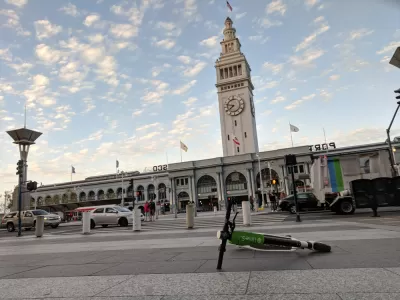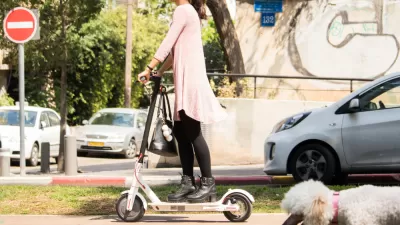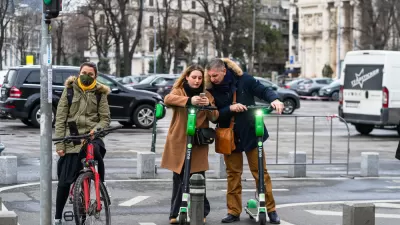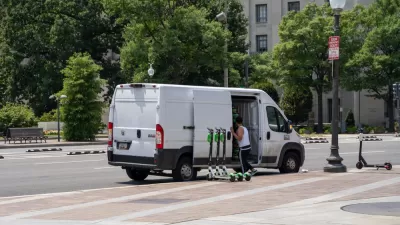A few notes on the policy landscape and media narratives that have emerged in response to the sudden appearance of electric scooter rental companies onto the planning scene.

When Planetizen first started publishing "scooter media briefs" in August of this year, it had already become very easy to gather news on the rapidly evolving world of electric scooter rentals, just a few months after electric scooters were made available to rent. In fact, articles about electric scooters were too frequent for the typical Planetizen news treatment, so a media brief format became necessary to keep up and not turn the website into a scooter information portal.
Usually, we at Planetizen read the news every day, highlight articles that are particularly noteworthy for some combination of "newsiness," insight, or analysis. We check in with major projects at major benchmarks, and we adjust editorial direction depending on the kind of media the world is producing that day or week (slow news weeks are, in fact, a very real thing).
With electric scooters, every story seems to check all of those boxes. Scooters obviously present a deeply consequential disruption of how people use the public realm—from sidewalk to sidewalk and everything between.
The sight of large numbers of electric scooters for rent is one of the most thorough transformations of the public realm in recent memory. My experiences with large numbers of rental scooters (scooters with riders, scooters parked on every sidewalk, scooters in trash cans) occurs in the Los Angeles neighborhoods of Venice and the streets between The Grove and the Beverly Center. Scooters aren't nearly as common in the neighborhoods where I live and work, so when I visit friends in those scooter-rich neighborhoods, the ubiquity of scooters still makes me feel like a tourist in my own city.
I have never in my life witnessed such radical evolution of the fabric of the community in so short a time. The buildings and business of the city where I grew up, Concord, California, have changed noticeably, but over decades. San Francisco, the cultural center of the region where I grew up, has changed noticeably, but over decades. My adopted neighborhood of Silver Lake has changed noticeably, but over the decade-plus I've been living there, and for decades before then as well. When scooters arrive to Silver Lake in the numbers I've seen in other parts of town, they might have to change the name of the neighborhood to Scooter Lake.
Despite the wave of change sweeping over these neighborhoods, media coverage was conspicuously absent in the early days of scooters. A lot of people have been talking about the revolutionary potential of self-driving cars for a long time—very few people were talking about rentable electric scooters suddenly taking over streets. Transportation network companies like Uber and Lyft had a slower adoption rate, and their fleets mostly blend into the traditional streetscape (until they double park to start or end a ride or block curb space in front of a bus stop), but the media coverage of those operations was fairly robust. Cars have always been given the benefit of collective optimism. No one expects the scooter revolution.
I didn't learn about electric scooter rental companies from CityLab, Next City, the Los Angeles Times, or a press release—the way I usually learn about important events or ideas about the way cities work. I first heard about Bird scooters on a YouTube video by Jesse Shapiro, one of my oldest friends. In the video, Jesse credits our mutual close friend Bobby Olson for introducing him to Birds.
Jesse posted his video in February 2018. The first mention of electric scooters or Bird in CityLab, as far as I can tell, wasn't until April 2018. In Next City, the first article came at the beginning of March 2018, with more at the end of March 2018. The San Francisco Chronicle was reporting on scooters like it was first contact with an alien invasion in March 2018. Bird was founded in April 2017. The first Bird scooters hit the streets of Los Angeles in September 2017.
I credit the trend-spotting skills of my friends to suggest that sometimes urbanism moves forward without any promotion from self-proclaimed urbanists or the usual arbiters of urbanism relevance. Bobby and Jesse were months ahead of the urbanism media on the subject of Birds. They saw something in Bird that it would take experts months to realize. Jesse's analysis in this short video is also super helpful for understanding why electric scooters have found instant success with so many people, especially when compared to the familiar, but failed, messages and programs to inspire more people to take the bus, or carpool to work.
The scooter companies provided easy access to the scooters. Then positive reviews and word of mouth made electric scooters more popular than anyone could have imagined. No one expects the scooter revolution. No amount of editorial page backlash, dangerous streets, lack of media coverage, or previous stigmas about how "cool" it was to ride a scooter could stop this scooter-sized train. Perhaps this is truly the wisdom of the crowds. Certainly, we see signs of a potentially transformative populism. Also certainly, we're reminded that urbanism journalists and Tweeters don't always get to decide what works for who and why.
At this point, scooter news is popping up just as steadily as it was in August, but somehow it seems slower. There just isn't much variety. There are opinion pieces written by alarmists, and there are opinion pieces written by apologists. There are news stories about scooter companies getting a permit, launching without a permit, or entering a legal battle over permits. There are only a few examples of cities making substantive changes to the public realm to accommodate scooters (hello, Santa Monica), and many more stories about cities banning scooters outright (hello, Norfolk).
But can anyone recall such a swift policy reaction to a perceived threat in the public realm? Homeless advocates in Los Angeles pleaded for hygiene stations and public bathrooms for years until a regional outbreak of Hepatitis A forced political leaders to act on their promises. Cities with skyrocketing housing prices are still tweaking and litigating legislation to deal with short-term rental companies—the same for transportation network companies as cities come to grips with perpetually worsening congestion and declining transit ridership.
None of a year's worth of ad hoc policy making, alarmism, or techno-optimism has succeeded in finding a comfortable and beneficial role for scooters. But still, getting this mode right would mean an incredible benefit to the quality of life, as well as environmental and public health outcomes, in the cities capable of seeing what many, many people saw right away.
While cities continue to figure out the right recipe for making scooters available and safe for everyone, maybe the wisdom of the crowd can help keep cities moving in the right direction.
Scooter Media Brief
National News
- Mapping the impact of dockless vehicles (Smart Cities Dive, Updated)
- Lime issues global recall of one of its electric scooter models amid fears that it can break apart in use (The Washington Post, Nov. 10)
- Bird asks riders to report misplaced and broken scooters (Smart Cities Dive, Nov. 9)
- Lime launches $3M campaign to promote rider responsibility (Smart Cities Dive, Nov. 6)
- Lime blamed its fire-prone batteries on Segway’s manufacturing. Now Segway is pushing back. (The Washington Post, Nov. 2)
- Will Lime's battery concerns spark a recall ripple effect? (Smart Cities Dive, Nov. 2)
National Commentary
- Could AR help cities regulate scooters? (Fast Company, Nov. 7)
Local News
- Norfolk says no to scooters, impounds 560 and fines start-up Bird $93,000 (The Washington Post, Nov. 16)
- Atlanta eyes regulation of booming electric scooter business (Atlanta Journal-Constitution, Nov. 13)
- Bird Says New Scooter Regulations Make It ‘Impossible’ To Serve D.C. (DCist, Nov. 12)
- Lime, Spin enter data-sharing agreement with Los Angeles (Smart Cities Dive, Nov. 12)
- Charging electric scooters didn’t cause St. Paul garage fire, investigation concludes (Pioneer Press, Nov. 9)
- Spin scooters, recently acquired by Ford, land in Detroit today (Curbed Detroit, Nov. 8)
- Scooter rider slows Bay Bridge rush-hour traffic, CHP says (East Bay Times, Nov. 7)
- Bird launches sneaky pilot in London despite e-scooter ban (Smart Cities Dive, Nov. 7)
- DC will allow more dockless bikes and scooters, but v-e-e-r-y s-l-o-o-o-w-l-y (Greater Greater Washington, Nov. 6)
- Bird sues Beverly Hills over its ban of motorized scooters (Los Angeles Times, Nov. 1)
Local Commentary
- Fast, cheap, and sometimes out of control: Is Boston ready for electric scooters? (The Boston Globe, Nov. 18)
- Lime scooter proponents say vehicle sharing program leaves Spokane more sweet than sour (The Spokesman-Review, Nov. 16)
- Clash of the scooters: Can these transit aids survive threats in the streets and courts? (The Denver Post, Nov. 16)
- New mobility options like Uber and Bird present challenges for transit (SaportaReport, Nov. 5)

Alabama: Trump Terminates Settlements for Black Communities Harmed By Raw Sewage
Trump deemed the landmark civil rights agreement “illegal DEI and environmental justice policy.”

Planetizen Federal Action Tracker
A weekly monitor of how Trump’s orders and actions are impacting planners and planning in America.

Why Should We Subsidize Public Transportation?
Many public transit agencies face financial stress due to rising costs, declining fare revenue, and declining subsidies. Transit advocates must provide a strong business case for increasing public transit funding.

Understanding Road Diets
An explainer from Momentum highlights the advantages of reducing vehicle lanes in favor of more bike, transit, and pedestrian infrastructure.

New California Law Regulates Warehouse Pollution
A new law tightens building and emissions regulations for large distribution warehouses to mitigate air pollution and traffic in surrounding communities.

Phoenix Announces Opening Date for Light Rail Extension
The South Central extension will connect South Phoenix to downtown and other major hubs starting on June 7.
Urban Design for Planners 1: Software Tools
This six-course series explores essential urban design concepts using open source software and equips planners with the tools they need to participate fully in the urban design process.
Planning for Universal Design
Learn the tools for implementing Universal Design in planning regulations.
Caltrans
Smith Gee Studio
Institute for Housing and Urban Development Studies (IHS)
City of Grandview
Harvard GSD Executive Education
Toledo-Lucas County Plan Commissions
Salt Lake City
NYU Wagner Graduate School of Public Service






























